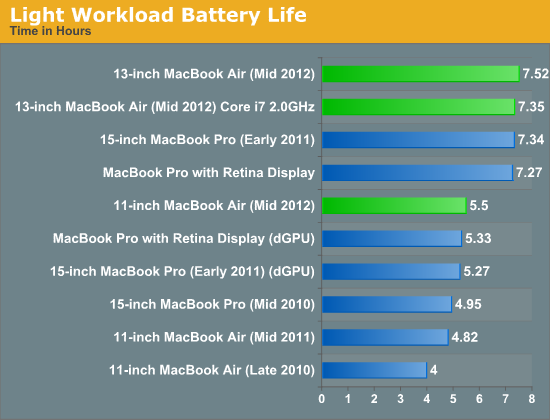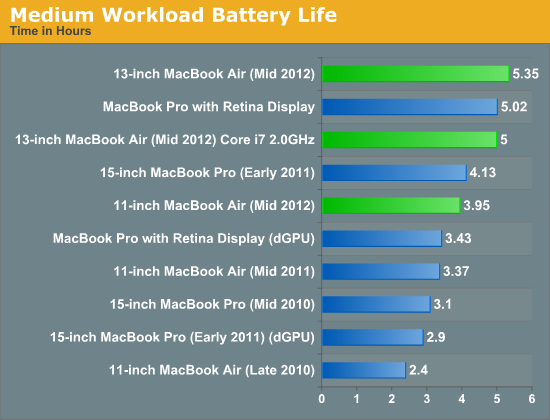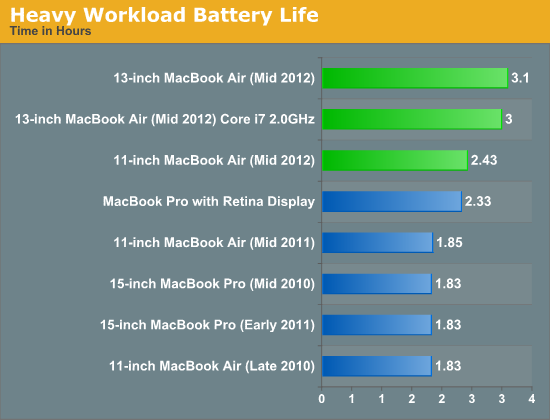The 2012 MacBook Air (11 & 13-inch) Review
by Anand Lal Shimpi on July 16, 2012 12:53 PM EST- Posted in
- Apple
- Mac
- MacBook Air
- Laptops
- Notebooks
Battery Life
The MacBook Air sees no increase in battery capacity over the previous generation, as a result any improvement in battery life boils down to what we get from Ivy Bridge. I'm stuck rebuilding the battery life results database from scratch now that I've built a new suite of tests for OS X. I've run all three generations of 11-inch MacBook Air through the new suite but I don't have numbers for the older 13-inch MBAs unfortunately. As I mentioned in the rMBP review, the new suite is designed to give accurate data points at three usage models: one light, one medium and one heavy. The combination of all three should give you an idea of the behavior of these systems on battery.
Across the board battery life of the 13-inch MacBook Air is actually quite similar to the Retina MacBook Pro, just from a much smaller battery and without the variability introduced by the rMBP's discrete GPU. If anything the lack of a discrete GPU makes using the MacBook Air much simpler from a battery life perspective. As much as I love Cody Krieger's gfxCardStatus application, it's nice not having to keep an eye on it to see if something silly has triggered the dGPU.

Under light usage the new 13-inch MacBook Air is easily able to meet Apple's claim of 7 hours of battery life. The 11-inch model does the same to its 5 hours rating, beating it by the same 30 minute margin as the 13.

The medium workload thins the herd a bit, with the 13-inch Air still coming out on top but at 5.35 hours. The 11-inch Air drops below 4 hours, which is an improvement over the previous two generations of 11-inch Airs. Once again we see an example of Ivy Bridge doing better than Sandy Bridge when it comes to mobile power usage.

Under heavy load is really where we see Intel's 22nm process deliver the gold. Here both of the 2012 MacBook Air models do very well. With the 13-inch MBA significantly outpacing even the rMBP with its 95Wh battery, while doing the exact same amount of work.
The 13-inch MacBook Air continues to be Apple's best notebook for those who care about battery life. The 11 offers portability but you do take a significant hit in battery life.










190 Comments
View All Comments
name99 - Tuesday, July 17, 2012 - link
The most likely reason for the USB3 problems is devices that are just slightly out of spec, demanding more power than USB3 can deliver. The larger rMBP is willing to give them this extra power, the smaller MBAs cannot.This is a very common problem these days with flash storage. Look at a table of the power demands of various disks for either startup or sustained writes --- it is depressing how many are almost (but just over) the USB3 limit --- and there are plenty of manufacturers (yeah, OCZ, I'm looking at you) who are quite willing to sell you a "USB3" drive which kinda sorta appears to run until you generate a long series of sustained writes at which point it hangs.
So why does the failure for these drives appear at plugin time?
One possibility is that they need a burst of juice to start themselves going, another is that they negotiate with the host and can't negotiate as much power as they want. (I don't know the USB3 power negotiation protocol.)
It would be an interesting experiment, IMHO, for Anand to try the problematic devices again with a Y cable that could deliver extra USB power from a second port.
jospoortvliet - Wednesday, July 18, 2012 - link
On a related note - neither can anyone sell the nice magsafe(2) adaptors, it seems. Quite annoying - I don't really get why it's legal that Apple can stop others from making those? I get they have patents on it, but wasn't the idea of the patent system to ensure inventors get decently renumerated, not to let them block others from using their inventions? I thought you HAVE to license your patents for a 'reasonable' fee... Still, all other laptops come without a magsafe-like plug...Romberry - Tuesday, July 17, 2012 - link
...or drowning in Kool-Aid. Apple cripples other OS's on their hardware (and does so for no good technical reason at all.) See my previous comment for more. Or take a look at Ed Bott's recent article on another site concerning battery life on a Mac running Windows. Or fire up Google.KPOM - Tuesday, July 17, 2012 - link
Here's what Ed Bott said:"I don’t blame Apple for this terrible performance. They’ve focused their engineering resources on their own hardware and their own operating system. For Apple, Boot Camp is a tool to use occasionally, when you need to run a Windows program without virtualization software getting in the way."
It's always been obvious that Boot Camp drivers are subpar, though it is getting better. However, most people aren't buying Macs to run Windows as the primary OS. They do enough to get Windows running occasionally, but they rightfully spend their time and effort optimizing their hardware for OS X. What's the issue there?
Incidentally, the new Boot Camp drivers do enable AHCI support, so TRIM, etc. will work in Windows 7 and Windows 8. They also generally deliver decent performance (the Core i7 bug notwithstanding). Apple doesn't need to make Boot Camp available at all.
Spunjji - Tuesday, July 17, 2012 - link
No good technical reason, for sure. Business reasons, on the other hand... There are many people out there who don't get the technical side of it, they just get what works and what doesn't. They see Windows running poorly on the same hardware, so they assume that with all things being equal that Windows is the source of the problem. Makes a simple kind of sense unless you know that Apple are responsible for tying the 2 together. They could easily do it properly, but they never will. Because they're Captialist Pigs! Yaaayyy! :DFreakie - Tuesday, July 17, 2012 - link
Wait wut... Are you being sarcastic? o_O It's not Apple's choice to allow other OS's on their laptop, it's the hardwork of the programmers for the other OS's that allow their OS's to be compatible with an incredibly large range of hardware. Unlike OSX which can't even figure out it's own small range of hardware. It's out of Microsoft's own decision that it can run on non-partnered computers that you build yourself, or buy from a company that doesn't make Windows computers. In fact. Apple puts specific features in OSX to make it not run on any hardware but theirs and users have to hack in order to get it to run on anything else.Apple should be hanged for their nonexistent allowances of other OS's.
KPOM - Tuesday, July 17, 2012 - link
Uh, without Boot Camp, it would be very difficult to run Windows, because Windows doesn't support Apple's implementation of EFI (which predates Windows' support for UEFI). Also, they do write drivers for their components. Microsoft's stock drivers don't support all the hardware used.Freakie - Tuesday, July 17, 2012 - link
Yes, Microsoft uses a new, more advanced, and completely 64bit compatible version of EFI. Just because Apple did it first, doesn't mean they somehow do it better now xP Though from what I've seen, the ability to put Windows on a Mac without any modifications isn't a fault of Windows, but differences between the two OS's as well as Apple's insistence of only allowing Windows on their system under their own terms. If Apple was more open about things, then hackers would have had to work less =PI also never said they didn't write their own drivers? o_O I mean, they obviously don't write all of their own drivers 100%, as I am sure that the hardware manufacturers have to give them something to start with.
And Microsoft's stock drivers are actually quite impressive. Of course they can' support every little peripheral, but they do an amazing job of supporting a countless range of combinations of hardware. There is no doubt that Microsoft's view on how it develops drivers is much more open than Apple's. Microsoft support DIY builders and system integrators as well, while Apple does not.
KPOM - Tuesday, July 17, 2012 - link
Boot Camp came out before Windows supported EFI at all. Apple has no real incentive to switch to UEFI because it doesn't really offer significant benefits, and they'd have to modify UEFI anyway to keep OS X proprietary.My point wasn't about UEFI, though. It is about Apple enabling other operating systems to run on their computers. They actively added that capability when they didn't need to.
Your point about MS' openness vs. Apple is well known. Microsoft is primarily a software company. Up to now, they haven't cared whether you installed Windows 7 on an Apple, a Dell, HP, or something you built yourself. However, with Windows RT, they are going partly the Apple route, since they won't sell the OS separately, and will individually approve manufacturers and designs. So apparently even they recognize there are advantages to a closed model.
Spunjji - Tuesday, July 17, 2012 - link
"When they didn't need to" <- What nonsense is this? A market requirement translates as a need. They would have lost all of the customers out there who require genuine Windows applications running under non-virtualised Windows. This is a non-trivial portion of the market.Apple do not do anything out of the generosity of their hearts. What wealthy company does?